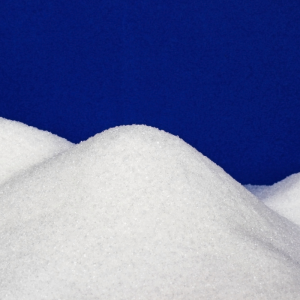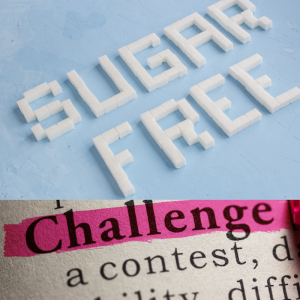 Are you sliding down a sugary, slippery slope? You know the one I mean. The one that begins innocently enough in the fall with a slice (or two) of Thanksgiving pecan or pumpkin pie and then a wee bit of Hallowe’en candy a few weeks later. You gain momentum with heaping helpings of holiday treats followed by boxes of Valentine’s chocolate. Before you know it, you’re gathering and gobbling the Easter bunny’s chocolate eggs (not to mention, if you love them as much as I do, hot cross buns). Suddenly, you find yourself awash in sugar. You have more of a sweet tooth than you used to and sugary treats have become a daily ritual, not just a holiday indulgence.
Are you sliding down a sugary, slippery slope? You know the one I mean. The one that begins innocently enough in the fall with a slice (or two) of Thanksgiving pecan or pumpkin pie and then a wee bit of Hallowe’en candy a few weeks later. You gain momentum with heaping helpings of holiday treats followed by boxes of Valentine’s chocolate. Before you know it, you’re gathering and gobbling the Easter bunny’s chocolate eggs (not to mention, if you love them as much as I do, hot cross buns). Suddenly, you find yourself awash in sugar. You have more of a sweet tooth than you used to and sugary treats have become a daily ritual, not just a holiday indulgence.
Does this sound familiar? If so, you’ve just slid down a sugary, slippery slope. I know I have. Read on for more about how easy it is to do this and why you really, really want to climb back up.
And I hope you’ll join me for my I’m Sweet Enough 7-day No Sugar Added Challenge (more on this at the end of this post).
Sugar makes us feel better but only in the short term
It is especially easy to slide down a sugary, slippery slope with pandemic fatigue well and truly entrenched. Things could definitely be more fun right now, after all, and sugar makes us feel better. It does this by directly activating the reward centres in our brains. As stated in this article by BrainsCAN Research Associate Amy Reichelt, “When the reward system fires, it reinforces behaviours — making it more likely for us to carry out these actions again. Dopamine ‘hits’ from eating sugar promote rapid learning to preferentially find more of these foods.”
Repeatedly activating this reward pathway by noshing on lots of sweet things causes the brain to adapt and develop a kind of tolerance. The result is that we need more and more sugar to feel the same reward. This is why sugar is thought to be an addictive substance. And, like many addictive substances (alcohol, nicotine, opioids), sugar makes us feel good in the moment. But it is decidedly not good for our health longer term.
I’ve slid down the sugary, slippery slope
 Sometimes we slide down the sugary, slippery slope ourselves and sometimes others can undo our best intentions with their best intentions. I was craving the aforementioned hot cross buns and so asked my husband to get “a couple” from our local bakery. He came back with half a dozen, two danishes and a scone (see photo). There are only two of us. And I had already splashed out on a carrot cake for our Easter treat. I blame him…ha ha…but admit I did my part in eating it all.
Sometimes we slide down the sugary, slippery slope ourselves and sometimes others can undo our best intentions with their best intentions. I was craving the aforementioned hot cross buns and so asked my husband to get “a couple” from our local bakery. He came back with half a dozen, two danishes and a scone (see photo). There are only two of us. And I had already splashed out on a carrot cake for our Easter treat. I blame him…ha ha…but admit I did my part in eating it all.
Did I mention that all this was preceded by a few weeks of indulging in muffins, bake-at-home chocolate croissants and indulgent desserts added to our celebrate-the-weekend-takeout orders (tiramisu, anyone)? As you can see, things can quickly get out of hand. So now it’s time for me to retaliate, recalibrate and clamber right back up that sugary slippery slope I just slid down. Will you join me?
But do I really have to lay off the sugar? I like sweet things!
So do I (obviously). But the brilliant thing about taking time off sugar is that it recalibrates our palates and resets our taste for sweet things. You will again be satisfied by the natural sweetness of foods (and find your own Watermelon Sugar high). A small bite of a treat on occasion will be plenty. But you’ll just have to take my word for it until you try it for yourself. All I can say is “trust me” and offer you some concrete reasons why kicking sugar to the curb is critical.
Insidious “-itis”
I’ve noticed some things insidiously creeping up on me over the last month or so:
- I’m feeling more sluggish than usual,
- I’m a bit bloated and my digestion is a little off,
- niggling stiffness, aches and pains are appearing and
- my face has gotten reddish and dry in places (Yes, eating a lot of sugar can affect your skin. Here’s how.)
I surmise that all that unaccustomed sugar I’ve been eating is behind it. Because sugar causes inflammation in our bodies. Any condition ending in “-itis” is an inflammatory condition. And it can cause inflammation in more than just our digestive tract (gastritis, enteritis, colitis), joints (arthritis) and skin (dermatitis). Overconsumption of sugar is behind many other serious, chronic diseases, which should be more than enough reason to shelve sugar. Allow me to expand…
A raft of reasons to sugar-proof your diet …
If you wish to delve into the mechanisms by which sugar effects the body in these ways, I invite you to click on the links I’ve provided in each section.
Lighten up
 Evidence continues to mount that sugar, not fat, makes you fat. This is due to sugar’s effect on the hormones leptin and insulin. [Leptin is the hormone that tells you when you are full and insulin is the hormone responsible for moving glucose (sugar) from your bloodstream into your cells.] You might think that fat tissue is an inert thing, functioning as it does as an energy reservoir. But as put so well in this article in The New York Times, “research has shown that fat cells act like chemical factories and that body fat is potent stuff: a highly active tissue that secretes hormones and other substances with profound and sometimes harmful effects on metabolism, weight and overall health.” This is excess baggage we could do without.
Evidence continues to mount that sugar, not fat, makes you fat. This is due to sugar’s effect on the hormones leptin and insulin. [Leptin is the hormone that tells you when you are full and insulin is the hormone responsible for moving glucose (sugar) from your bloodstream into your cells.] You might think that fat tissue is an inert thing, functioning as it does as an energy reservoir. But as put so well in this article in The New York Times, “research has shown that fat cells act like chemical factories and that body fat is potent stuff: a highly active tissue that secretes hormones and other substances with profound and sometimes harmful effects on metabolism, weight and overall health.” This is excess baggage we could do without.
Reduce your risk of type 2 diabetes
Sugar not only increases your risk of obesity, it also increases your risk of type 2 diabetes. This is true even if you are not overweight. And approaching menopause and beyond, you are at greater risk of developing type 2 diabetes because sex hormones estrogen and progesterone affect your cells’ response to insulin. As hormone levels fluctuate during the transition to menopause, your blood sugar levels can also fluctuate and uncontrolled high blood sugar can lead to diabetes.
This article in Healthline does a good job of summarizing how “some of the changes that occur in your body during menopause put you at greater risk of type 2 diabetes:
- Your metabolism slows and you don’t burn calories as efficiently, which can lead to weight gain.
- Much of the weight you gain is in your belly. Having more belly fat makes your body more resistant to the effects of insulin.
- Your body releases insulin less efficiently.
- Your cells don’t respond as well to the insulin you produce.
Excess sugar in the diet, pre-diabetes and diabetes can worsen some menopause symptoms and vice versa. For example, hot flashes make it harder to sleep. A lack of sleep can affect your blood sugar control.”
Lower your risk for a whole host of other chronic conditions
 High sugar intake and diabetes puts you at greater risk of:
High sugar intake and diabetes puts you at greater risk of:
- cardiovascular disease such as heart disease and stroke (consuming excess sugar may also lead to heart palpitations) and
- Alzheimer’s disease (in fact, the link between uncontrolled blood sugar and Alzheimer’s disease is becoming so strong that it is often referred to as type 3 diabetes).
Diets high in sugar may also:
- mess with your sleep (which, ironically, leads to sugar cravings),
- contribute to anxiety and depression,
- contribute to osteoporosis (through it’s impact on mineral absorption and excretion and on bone remodelling activity),
- aggravate arthritis (both from an inflammatory perspective but also because sugar consumption increases weight and, thus, the stress on weight-bearing joints) and
- increase your risk of cancer, by increasing obesity (which elevates cancer risk) or possibly by driving high levels of insulin.
Love your liver
Did you know that too much sugar in your diet can be as harmful to your liver as alcohol? Diets high in fructose (the largest sources of which are refined sugar and high-fructose corn syrup), can lead to non-alcoholic fatty liver disease (NAFLD). NAFLD can lead to inflammation of the liver, impacting its ability to perform its 500+ vital functions (including detoxification, protein synthesis and the production of chemicals that help digest food) as effectively or efficiently. This is not good news as the liver is as important to us as our brain or heart. If your liver stops working, so do you. Not only is it the largest solid organ in our body, it is the only one able to regenerate itself (provided the damage isn’t too severe). From an evolutionary perspective, that’s saying something.
Weather the COVID-19 storm
By now I am sure you have read that many of the chronic conditions I’ve mentioned increase your vulnerability to SARS-CoV-2 infection and COVID-19 complications. Our sugar consumption pandemic has certainly played a role in exacerbating the COVID-19 pandemic. It just isn’t worth it.
It’s time to climb back up the sugary, slippery slope
 I just finished watching an old Discovery Channel documentary (on my armchair travels) about an expedition to Everest. Among the climbers was vivacious British socialite Annabelle Bond (who really did bring her lipstick up the mountain with her). After safely returning, she said that while reaching the summit was, hands-down, the hardest thing she had ever done, she felt fantastic and was so glad she did it.
I just finished watching an old Discovery Channel documentary (on my armchair travels) about an expedition to Everest. Among the climbers was vivacious British socialite Annabelle Bond (who really did bring her lipstick up the mountain with her). After safely returning, she said that while reaching the summit was, hands-down, the hardest thing she had ever done, she felt fantastic and was so glad she did it.
Climbing back up the sugary, slippery slope will be the same (though, obviously, on less grand a scale). It will be hard to do when you are doing it but, afterward, you will feel fantastic and be so glad you did it.
I have experimented with my diet in many ways since becoming a nutritionist: no gluten, no dairy, no red meat, no caffeine, no alcohol, no refined sugar (and sometimes all of the above at once). Yet the one thing I have never tried is no added sugar of any kind (as in, not even honey, maple syrup nor sweeteners like monk fruit or stevia). So I’m going to mount an expedition to climb back up my sugary, slippery slope by cutting out all added sugar. I plan to do this for a few weeks but am looking for some company for the first week, which will be the most challenging. To entice you to join me, I’ve created the I’m Sweet Enough 7-Day No Sugar Added Challenge.
Will you join me for my I’m Sweet Enough 7-Day No Sugar Added Challenge?
 It’s both sugar-free and free. I won’t be eliminating whole foods that naturally contain sugar (like fruit) so, rather than achieving the summit, it’s more akin to getting to the Khumbu Icefall. But there will be no added sugars or foods that quickly turn to sugar in the bloodstream (like refined flour and other refined grains) on the menu. Nor will there be beverages that contain sugar (that includes alcohol – so consider yourself warned).
It’s both sugar-free and free. I won’t be eliminating whole foods that naturally contain sugar (like fruit) so, rather than achieving the summit, it’s more akin to getting to the Khumbu Icefall. But there will be no added sugars or foods that quickly turn to sugar in the bloodstream (like refined flour and other refined grains) on the menu. Nor will there be beverages that contain sugar (that includes alcohol – so consider yourself warned).
It takes tens of thousands of dollars and well over a month to acclimatize and climb Everest. And it is mighty cold and windy. My expedition is free and will only take a week out of your life. What have you got to lose? Except maybe a little weight.
I will provide you with the rules of engagement and a 7-day meal plan* as well as tips and tricks to prevent and/or conquer any sugar cravings. And we’ll have each other for support and encouragement.
*The meal plan is optional. It takes care of the planning and removes the guesswork for you but feel free to do all of it, some of it, or none of it. The point is to eliminate added sugar for a week, however you wish to accomplish it.
The expedition starts May 3rd. Are you in? And why not challenge a friend to join you? After all, misery loves company, right? Just kidding. But studies show that we are more successful at making change when we build an element of accountability into the process. As your accountability partners will be in it along with you, we can all support each other. That’s why I hope you will join me May 3rd to shelve the sugar and find your healthy sweet spot.
Stay tuned for details and a link to sign up for the challenge in my next post.
Great reminder. Iam in for the challenge. I have done this before. But always safety in numbers
Hope you are both well
X
Beth
Fantastic, Beth – glad to have you along for the ride! Safety in numbers is right. 😉 My invitation email with the sign up link will be sent this coming weekend so keep an eye on your inbox. Hope you are well also! xo
Great post Laurie! I have just begun weaning myself off of sugar and plan on being ready for going completely without sugar (with the exception of whole fruit). 🙂
Ali
Great to have you on board, Ali! And good idea to start weaning off sugar in advance of the challenge. Keep an eye on your inbox for the invitation email with the sign up information.